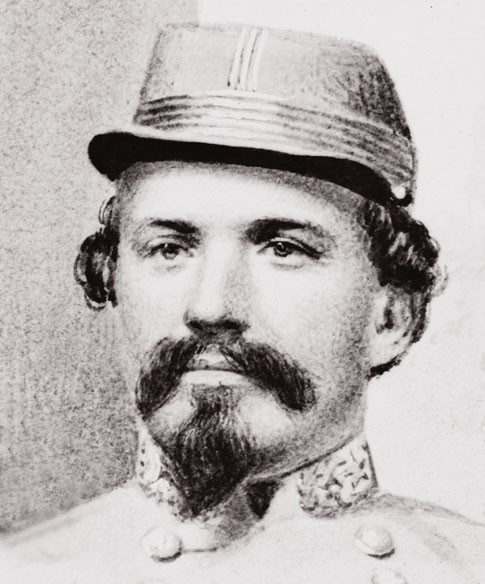Get Today in Masonic History into your Inbox. Sign up today for one of our email lists!
Need an article for your Trestleboard/Newsletter see our Use Policy
John Hunt Morgan is Born

Today in Masonic History Norman John Hunt Morgan is born in 1825.
John Hunt Morgan was a Confederate General during the American Civil War.
Morgan was born in Huntsville, Alabama on June 1st, 1825. Morgan attended Transylvania College for two years, he was suspended in 1844 for dueling with a fraternity brother. Morgan strongly wanted a military career. At the time there were few opportunities in the United States Army.
In 1846, Morgan enlisted in the United States Army to serve during the Mexican-American War. He was quickly promoted to 1st Lieutenant. He saw combat with his unit at the Battle of Buena Vista.
In 1857, Morgan raised a militia called the Lexington Rifles. He spent much of his free time drilling his men.
In 1860, in a letter to Morgan's brother, he expressed his desire, like many other Kentuckians, not to secede. He felt Lincoln needed a chance and only if he committed an overt act against the south should they join together.
In September 1861, Morgan, now a captain, headed to Tennessee to join up with the Confederate Army. He was promoted to colonel and placed in command of the 2nd Kentucky Calvary Regiment. The 2nd Kentucky fought at the Battle of Shiloh and became a symbol to secessionists when the state joined the Civil War on the side of the Confederacy.
In July 1862, Morgan began raids throughout Kentucky hoping to remove all Federal troops. Morgan claimed his raids in Kentucky captured and paroled 1,200 Federal soldiers. By the end of the year Morgan had been promoted to brigadier general.
In 1863, Morgan began an offensive known as "Morgan's Raid". The offensive took Morgan to Indiana and Ohio. In one raid in Versailles, Indiana, Morgan discovered a local Masonic Lodge was raided and the lodge's jewels were taken. Morgan returned them the following day.
Morgan's Raid came to an end on July 19th, 1863. Most of his men were captured while crossing the Ohio River, they were sent to Camp Douglas, Prisoner of War Camp. Shortly after Morgan himself was captured. Along with 6 of his officers, Morgan escaped from a prison in Ohio by digging a tunnel and making a rope from linens in the prison. Regardless of how Morgan's Raid ended, it was a major nuisance to the Union at the time. It was covered by both Union and Confederate papers. It is now considered a minor event in the overall Civil War.
After returning to Kentucky, Morgan was given another command. His new unit did not compare with the last. He was unable or unwilling to control his troops and they began raiding indiscriminately in Kentucky. At the Battle of Keller's Bridge, Morgan won a minor skirmish against Union troops. Embolden by the victory he led his men against a far superior Union force and was utterly defeated. The loss was a major blow to the Confederacy and lost Morgan the trust of his commanding officer.
On September 4th, 1864, Morgan was surprised by a Union attack and was shot in the back while retreating.
Morgan was a member of Daviess Lodge #22 in Lexington, Kentucky, joining in 1846.
| S | M | T | W | T | F | S |
| 1 | 2 | 3 | 4 | 5 | 6 | |
| 7 | 8 | 9 | 10 | 11 | 12 | 13 |
| 14 | 15 | 16 | 17 | 18 | 19 | 20 |
| 21 | 22 | 23 | 24 | 25 | 26 | 27 |
| 28 | 29 | 30 | ||||
Other Events Today
James Buchanan Jr. Passes Away
Philip Wharton, 1st Duke of Wharton Passes Away
Thomas Witherell Palmer Passes Away
Charles Kennedy, 5th Marquess of Ailsa Passes Away

